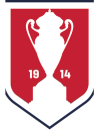After sitting out the Round of 32 game, a 2-0 win over amateur darlings Dallas Roma, Donovan was spectacular in the Quarterfinal against the Colorado Rapids.
The plan was for Donovan to see as little action as possible because of an upcoming heavyweight league match against D.C. United. But with the Galaxy trailing 1-0, he had to be subbed in early due to an injury and nearly tied the game immediately when his header skipped off the hip of Rapids goalkeeper Matt Jordan.
Quavas Kirk eventually equalized to set the stage for Donovan’s heroics.
Just two minutes and 15 seconds into extra-time, Kirk sent a cross into the area. Alan Gordon missed the chance, but Donovan, unmarked at the far post, slipped the game-winner past Jordan.
He put the exclamation point on the win, and his own performance, with a second extra-time goal with just five minutes remaining, beating Jordan on a breakaway and sealing a 3-1 win for the Galaxy.
Donovan then went on to score his third goal of the competition in a 3-1 Semifinal win over the Houston Dynamo. But the Galaxy fell short of a repeat title, losing out to a Chicago Fire side that claimed their fourth (and last to date) Open Cup crown.
Of Donovan's six Open Cup goals for the Galaxy, three came in that 2006 campaign.
Way Back in the Inky Past
Nearly 80 years earlier, American soccer’s first big star, and a member of the first Hall of Fame class inducted in 1950, put his mark on what was then known as the national Challenge Cup.
Archie Stark, whose 253 goals in the American Soccer League (ASL) remain a U.S. pro soccer record, became the first player to register a hat-trick in an Open Cup Final.
There was no bigger stage and no bigger spotlight for that 1926 game, which was played at Ebbets Field, the legendary home of baseball’s Brooklyn Dodgers, in front of a crowd of 15,000.
It was a familiar venue for Stark, and one where he’d already scored in bunches, putting home four goals against Canada a year earlier in his first of two games with the U.S. National Team.
Stark gave Bethlehem Steel a lead before the St. Louis Ben Millers could even break a sweat. Inside eight minutes, he got on the end of a corner-kick and tucked the ball home.
















